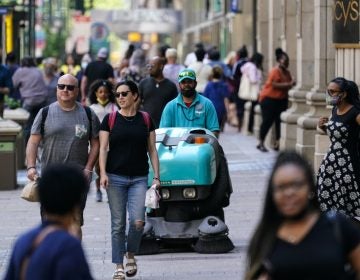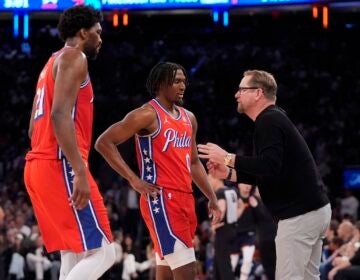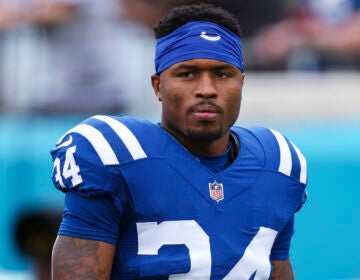Can mayoral candidates get their messages to millennials?
Listen-

-

-
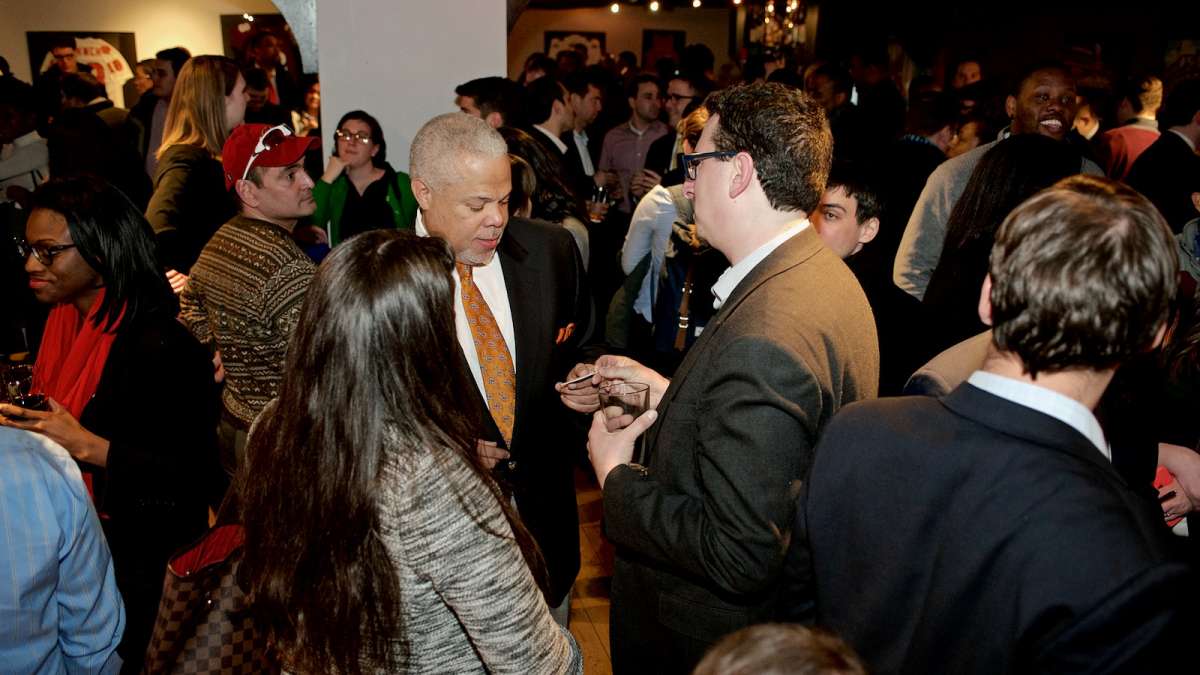
-

-
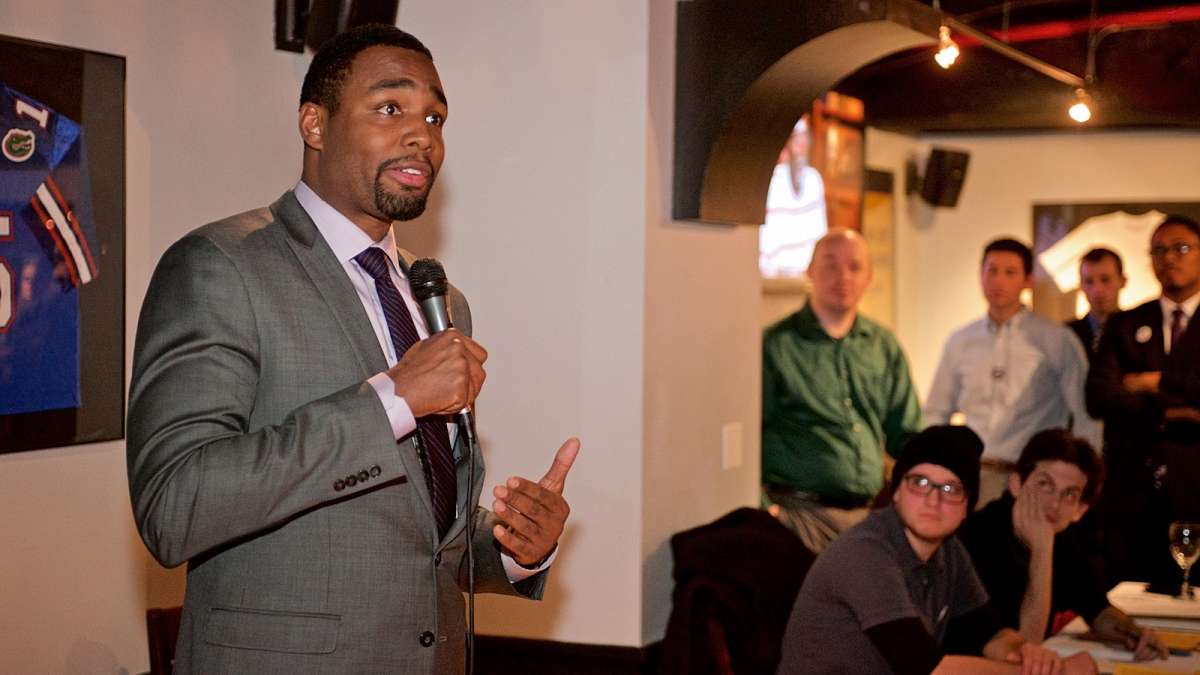
-

-

-

-

-

-

-

-

-

-
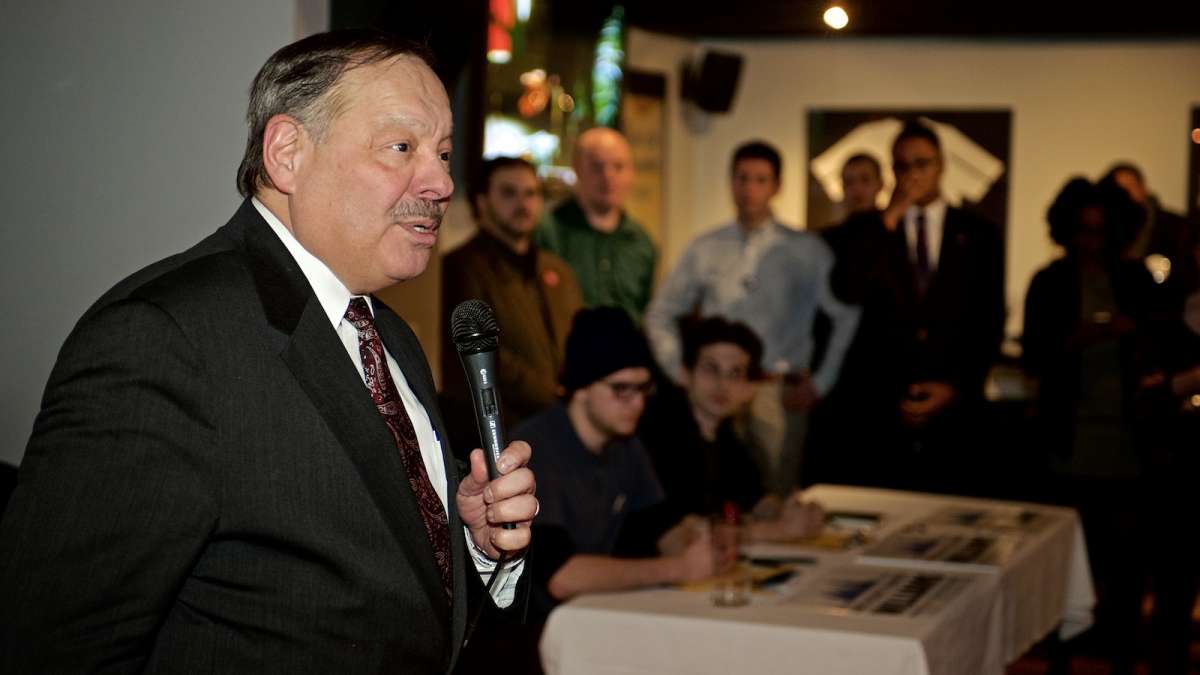
-
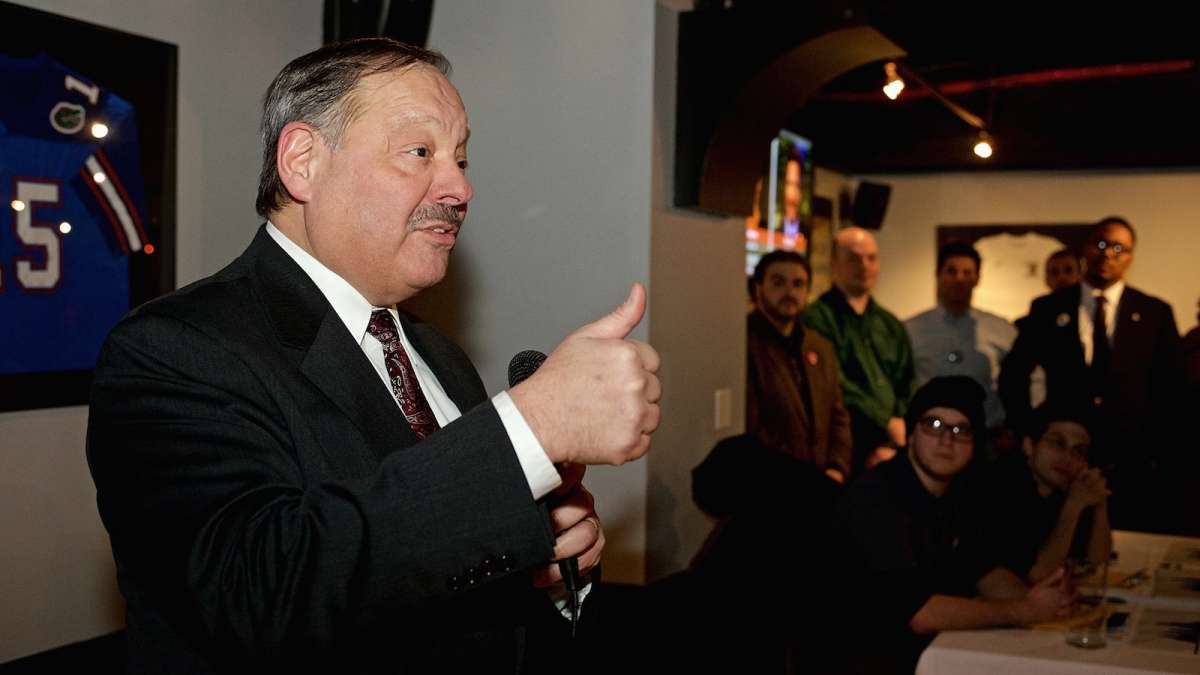
-

-

-

-
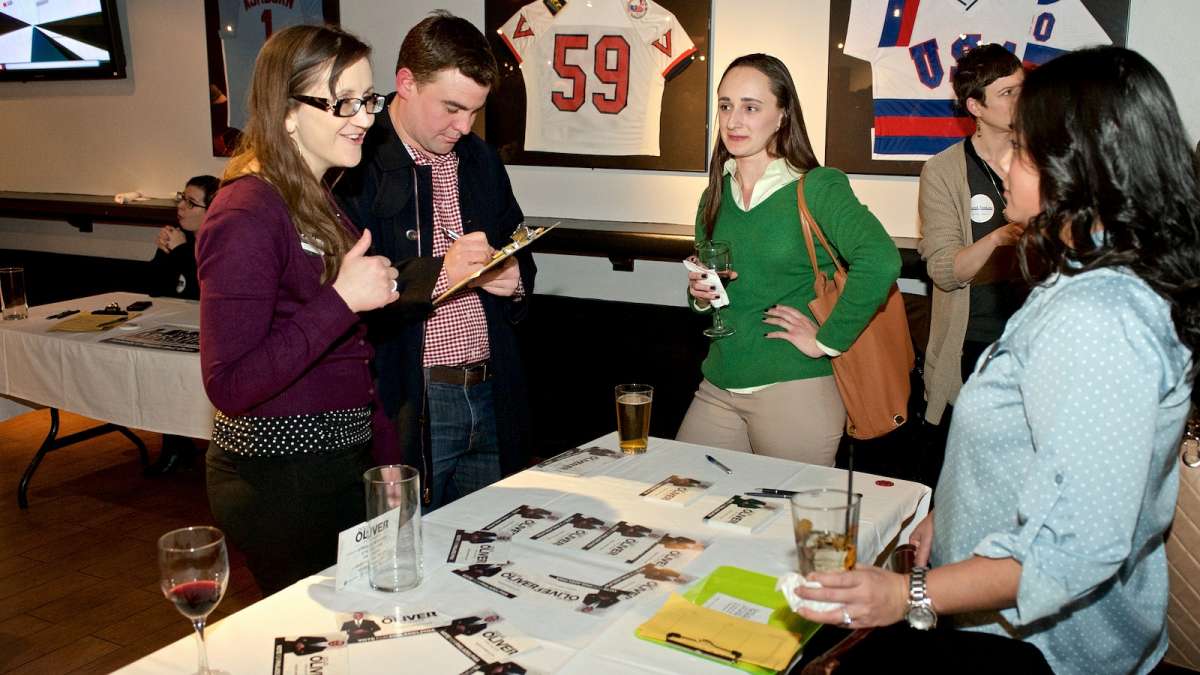
-
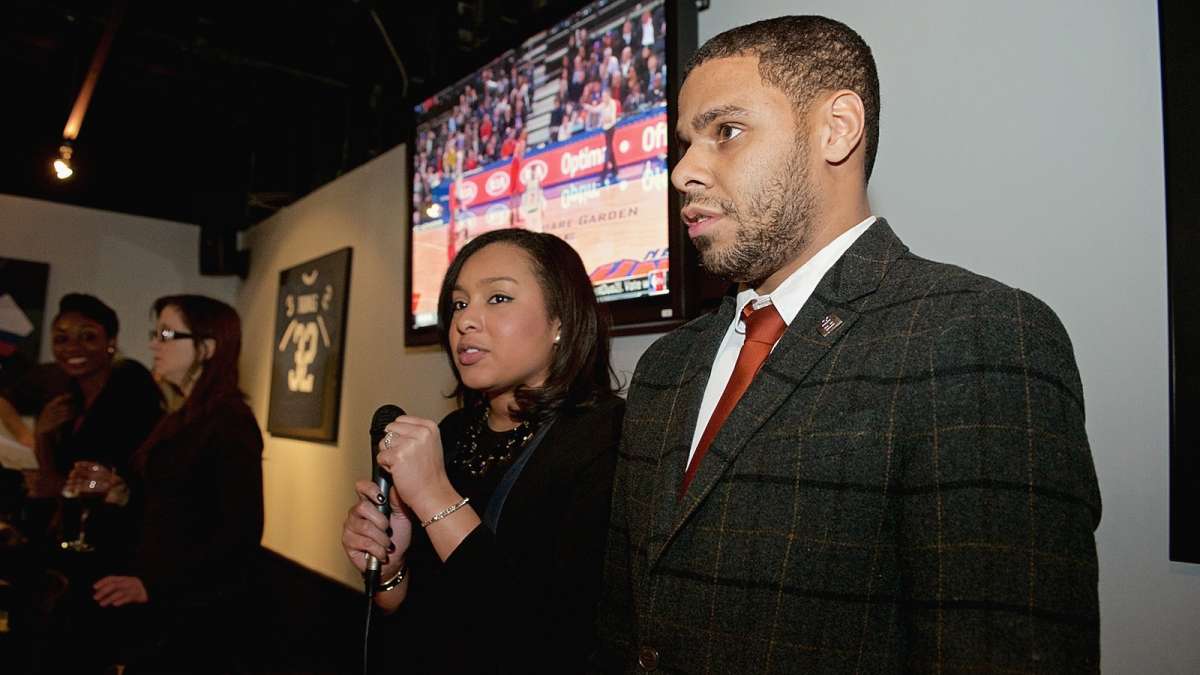
The Petition Pitch Party is organizes by the Pattison Leaders Group, which is co-founded by Nicole Allen-White and Kellan White. (Bas Slabbers/for NewsWorks)
-

Philadelphia’s growing millennial population-loosely defined as those born between 1980 and 2000 — hasn’t gone unnoticed by the mayoral candidates. A recent petition signing party provided the candidates an opportunity to reach young voters.
Daniel Douglas is about to finish his Bachelor’s degree in physics at Drexel University.
“I’m from up in Northeast Pennsylvania, up near Hazleton,” he said during a recent interview. “It’s much, much more rural than it is here, so when I first moved here it was a little bit of a shock.”
When the shock wore off, Douglas came to appreciate Philadelphia.
“I really like the city,” he said. “I feel like it has a certain attitude, and there’s definitely a sense between people who live in Philadelphia, you definitely identify as a Philadelphian. There’s a sense that it’s a big city without being too big. Like I could never imagine myself living in a big city like New York, but Philly doesn’t seem that big, but it has a lot to offer.”
After college, Douglas will apply to grad school. He says he’s applying to at a couple of programs in Philadelphia, and could see himself here in five or ten years.
“I think it’s a place that I’d be happy to live,” said Douglas. “Whether or not my career takes me there is another thing, but I would be more than pleased to end up here.”
Philadelphia’s growing millennial population-loosely defined as those born between 1980 and 2000 — hasn’t gone unnoticed by the mayoral candidates. A recent petition signing party provided the candidates an opportunity to reach young voters. Candidates like state Senator Anthony Williams.
“We need your energy young people,” he told the crowd at the party. “We need your insight, young people. We need your creativity, young people. And most importantly, we need you not to leave.”
Former District Attorney Lynne Abraham had a similar plea.
“I want everyone here in this room to join with me in a coalition of great youth and great experience and great brain power and turn this city around,” she said.
Former judge Nelson Diaz made a personal pitch to help out with the group’s dance moves.
“We want to keep the city open 24 hours so millennials can party whenever they want to,” said Diaz. “You should have the opportunity, you’re studying all night, you’re working all day, you want to get out there maybe till 1, 2:00 in the morning and dance some salsa. You know, I’d be happy to teach you. I’ll be out there as the mayor, with my wife, teaching you how to do some salsa.”
But no candidate seems more focused on the city’s youth movement than Doug Oliver. A youthful 40 years old himself, Oliver is staking much of his campaign on reaching young voters.
“When I look at this room, I don’t see interns,” he told them. “When I stand in this room, I don’t see entry-level communication professionals. When I look in this room I see homeowners. I see parents. I see people that are going to build a future for themselves and for this city. I see CEO’s. I see entrepreneurs, and I see solutions to the challenges that face our city.”
Philadelphia’s growth in population over the past eight years, which reversed a nearly half-century trend of decline, was driven largely by an influx of young people. Between 2006 and 2012, the city’s population grew by about 59,000, according to Census data assembled in a Pew Research report last year. But the total number of those age 20 to 34 rose from 20 percent to 26 percent, indicating there were about 100,000 more young people living in the city in 2012 than six years earlier.
Now, on this point, all the candidates can agree: to keep young people in the city, there are two major issues that need to be addressed: jobs and education.
These two issues are deal breakers for millennials as they get older and start to put down roots. Nick Marzano is the president of Young Involved Philadelphia, a group of involved, politically engaged citizens in their 20’s and early 30’s.
“Public education the state of public education right,” said Marzano. “Of course jobs is just a matter of am I going to stay here or am I going to be able to stay here and make a living. The issues I hear about from millennials that matter are very similar to the issues that matter for any Philadelphian I would say. You know there are quality of life issues I think and those are the positives things that Philly really has going for it and could serve as an entry point for a lot of millennials to getting involved in something like the mayor’s race.”
And that point — that last point about millennials getting involved in the mayor’s race? That is the big problem for candidates. Of the ones I talked to, few knew the names of any of the candidates.
Now, primary day is more than two months away and no candidate has released ads yet, so it’s understandable that these potential voters wouldn’t be familiar with who’s running. Still, that means candidates have only that amount of time to reach young voters, who as a group can be a challenging one to get to the polls.
“If you just look at voting, people tend to vote, particularly in local elections if they think they have stake,” says Larry Eichel, Director of the Philadelphia Program of the Pew Charitable Trusts, which wrote the report on millennial growth last year.
“They tend to think they have stake if “hey this is where I live, this is where I’m going to live,” said Eichel. “But if you’re somebody who is just passing through or if you don’t know, I think its harder to get interested in civic affairs, it’s harder to get involved and I think that’s why historically young adults are not that involved in politics.”
Here are some startling statistics assembled by Tom Ferrick of Axis Philly.
Among voters ages 25 to 34, only 59 percent have voted within the last ten elections. Compare that to nearly 80 percent of those 55 to 64. If you add in younger voters, ages 18 to 24, the number drops to just 46 percent.
According to the statistics, nearly 100,000 Philadelphians under 34 have voted in just one election, with far fewer voting in more than one. That number likely refers to those who registered during college, and since many of them have left, they won’t be showing up at the polls, though their names are still on the books.
Also, voters under 34 constitute nearly half of all those in the city registered “independent.” In Pennsylvania, independent voters can’t vote in party primaries.
All this makes garnering votes from millennials — like Daniel Douglas — a challenge.
By the way, Douglas is registered to vote, as an independent.
“We have a new poll and one of the questions people in this poll was ‘Do you plan to vote in the mayor election?'” Eichel said. “Now any pollster will tell you that you can’t count on people to be totally honest in that poll, a lot of people say they are going to vote and don’t. But, in any event, the percentage of the young adults we talked to that said they were definitely going to vote was much much lower than any other age group, way lower than the 65 and older crowd.”
But whether they get him to vote for them, they know making the city a better place for him to live will drive the city’s growth in years to come.
Philadelphia is a city on the upswing. If you’re making that argument, you’re looking at a boom in housing in certain neighborhoods, hundreds of thriving small businesses, and growing national and international cache.
So, what’s drawing them here?
More young people do seem to be staying in Philadelphia post-college than in years past, lured, by a low cost of living and improving neighborhoods. The trick will be how to keep them.
WHYY is your source for fact-based, in-depth journalism and information. As a nonprofit organization, we rely on financial support from readers like you. Please give today.


